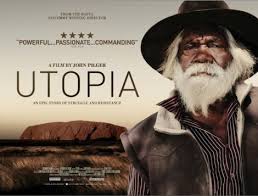
UTOPIA
Australia/UK, 2013, 110 minutes, Colour.
Directed by John Pilger.
Since the 1960s, John Pilger has been an investigative journalist, based in London but of returning to his native Australia. In the 1970s, he began making hard-hitting film documentaries. A number of these were concerned about Australia and aborigines, especially the 1985 Secret Country: The First Australians Fight Back.
In 2012-2013, he returned to Australia to explore the theme of how the Australian people and governments responded to aborigines and then needs. This is the resulting film.
The structure of the film is not a well-thought out and logically developed argument. Rather, Pilger sets the scene but then chooses a number of episodes which could have been placed in any order in this film. The response of the audience is to the detail and cogency of these episodes and the cumulative effect. Audiences concerned about Australia and aboriginal people will find a great deal of interest and concern. However, Pilger has his critics, criticised for his bias, the arrangement of his arguments, the melodramatics of some of the films styling in music and use of colours and darkness in photography to make his point. The same criticisms have been made of the documentaries by America’s Michael Moore – but, as in Moore’s films, if only half of the material presented is accurate, then it presents damning condemnation.
Pilger himself appears in the film, appearing much older, travelling to the Northern Territory and Western Australia, interviewing people, including a number of politicians, especially Mal Brough, the Howard minister responsible for the 2007 Intervention, as well as an interview with Kevin Rudd, featuring the apology, and asking questions of Rudd about the aftermath and the lack of development. Pilger is nothing if not confronting and demanding.
The following is a list of themes presented in the film.
• Pilger and his journalistic experience, his filmmaking, his interviews with aborigines in the past, especially Eddie Murray’s parents, and his returning to these themes and interviews.
• The title, the visit to the Palm Beach luxury holiday home, the costs, the suburb of Canberra, Barton, considered one of the most affluent of areas, the comment on Barton and the White Australia policy and the absence of aborigines in the Constitution, the transition to the community outside Alice Springs, Utopia.
• Impressions of the landscapes, the range of landscapes, especially in the Northern Territory?
• Utopia, the town and community, the issue of health, the visuals, the run-down atmosphere, poverty, sanitation, breakdown, one well for water, the deprivations? The interview with David Smith, his work for the community, his explanation of the potential for many diseases? The interview with Warren Snowden, the Minister for aboriginal affairs, in Parliament for so many years? Snowden’s pride in what the government was doing at that time, but not able to explain the previous decades?
• The historical re-enactments, the celebration of Australia Day, 2013? Sydney, the atmosphere of festivity? Pilger and his interviewing ordinary people, their extraordinarily ignorant comments, racist comments, bigotry? How typical of the Australian population in ignorance?
- Rottnest Island, the ferry over, the luxury hotel, built on the prison, even the quad? No reference to the prison history of Rottnest Island, the many aborigines interned there, crowding and deaths? The aboriginal commentator, speaking about the degradation? The manager of the resort and the intentions to do something about the memories?
• The issue of putting people in “Protective Custody”? Getting people off the streets? The statistics of aborigines in prison? Pilger’s asking the question of whether this was equivalent to apartheid, in comparison with South African statistics during the apartheid era? The many deaths in custody*
- The story of Eddie Murray, his being taken, ill-treated, his death? Pilger’s visit to his parents, the interviews over several decades? Eddie Murray’s father, his reflections, his wife’s death, the visit to the cemetery, the call for Justice and nothing happening over 30 years?
- The Australian “Fair Go” as applied to aborigines and wages? The issue of working with cotton, the strike, getting just wages? Aboriginal resistance, the stockman, the cattle industry, the visuals of the protest at Wave Hill and the leader and his confidence?
• John Howard, his policies, the intervention, the announcement with Mal Brough? The background of the accusations of paedophilia in aboriginal communities, the particular community, the denials? The evidence against this? The ABC program, Lateline, the interview with the government official in shadow, his information and statistics, his not having lived in the community, the range of experts and the disbelief about this program, about the claims?
• Jay Creek, the issues of the stolen generation? “Breeding the black out…”? Issues of genocide? The testimonies of women from the stolen generation, their history, their pining for their mothers? The background of the girls being collected, The Bungalow, white men raping the girls?
• The apology, the role of Kevin Rudd and his government, Pilger interviewing Rudd and discussing the aftermath of the apology, expectations which were not fulfilled?
• The opening quote from Lang Hancock, hunting aborigines, herding them together, putting something in the water to sterilise them so that they would die out? Seeing his daughter and the mining issues, her speeches, her wealth, the axing of the tax? The presentation of the mining areas, exploiting minerals that they did not own on land that they did not own? Mining taxes, the role of the government’s?
• What was the audience left with at the end of the film? Pilger’s particular perspective – sometimes melodramatic, sometimes accusatory, but making a case on behalf of the aborigines, the long history, the invasion, their culture and the loss of culture, the role of governments, the need for support?
• The fact that there was no mention of religion or the churches and their role with aborigines, nothing on the achievements of aborigines in politics, sport or the arts?